
Significant factors in the manifestations of hyperactive children aged 7-8
Versandkostenfrei!
Versandfertig in 6-10 Tagen
13,99 €
inkl. MwSt.

PAYBACK Punkte
7 °P sammeln!
The psychological characteristics of primary school children have always attracted the attention of specialists due to the fact that the child is going through a crisis period of the age of seven and is acquiring a new and very significant social status of a schoolboy. Modern developmental psychology has accumulated data on the psychological characteristics of younger schoolchildren and on educational programs which, on the one hand, allow us to orient their instruction toward the zone of closest development (D.B. Elkonin, V.V. Davydov, L.V. Zankov, etc.). In addition, on the other hand, these...
The psychological characteristics of primary school children have always attracted the attention of specialists due to the fact that the child is going through a crisis period of the age of seven and is acquiring a new and very significant social status of a schoolboy. Modern developmental psychology has accumulated data on the psychological characteristics of younger schoolchildren and on educational programs which, on the one hand, allow us to orient their instruction toward the zone of closest development (D.B. Elkonin, V.V. Davydov, L.V. Zankov, etc.). In addition, on the other hand, these programmes, which are widely known both in our country and abroad, are aimed at shaping a new leading activity in children - learning (V.V. Davydov, G.A. Tsukerman, A.Z. Zak, etc.).
The psychological characteristics of primary school children have always attracted the attention of specialists due to the fact that the child is going through a crisis period of the age of seven and is acquiring a new and very significant social status of a schoolboy. Modern developmental psychology has accumulated data on the psychological characteristics of younger schoolchildren and on educational programs which, on the one hand, allow us to orient their instruction toward the zone of closest development (D.B. Elkonin, V.V. Davydov, L.V. Zankov, etc.). In addition, on the other hand, these programmes, which are widely known both in our country and abroad, are aimed at shaping a new leading activity in children - learning (V.V. Davydov, G.A. Tsukerman, A.Z. Zak, etc.).
The psychological characteristics of primary school children have always attracted the attention of specialists due to the fact that the child is going through a crisis period of the age of seven and is acquiring a new and very significant social status of a schoolboy. Modern developmental psychology has accumulated data on the psychological characteristics of younger schoolchildren and on educational programs which, on the one hand, allow us to orient their instruction toward the zone of closest development (D.B. Elkonin, V.V. Davydov, L.V. Zankov, etc.). In addition, on the other hand, these programmes, which are widely known both in our country and abroad, are aimed at shaping a new leading activity in children - learning (V.V. Davydov, G.A. Tsukerman, A.Z. Zak, etc.).












